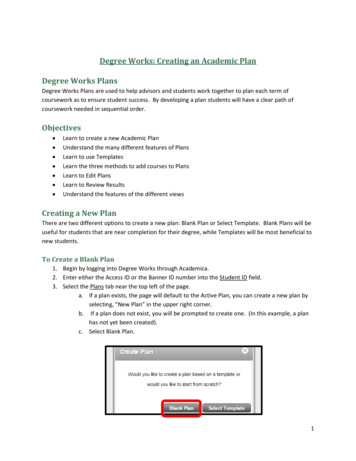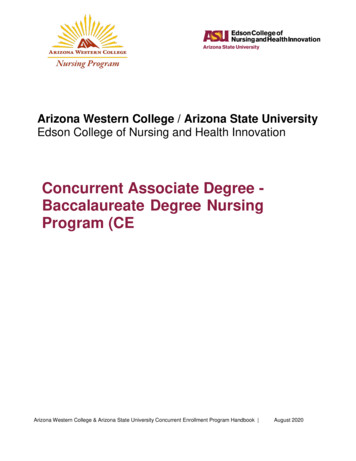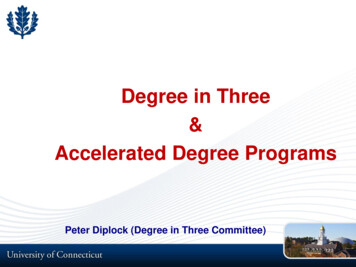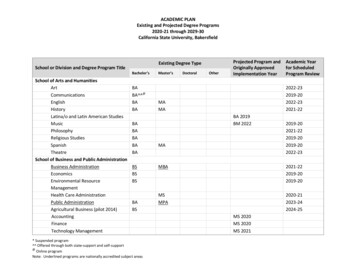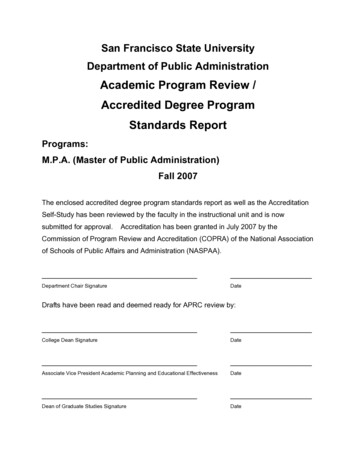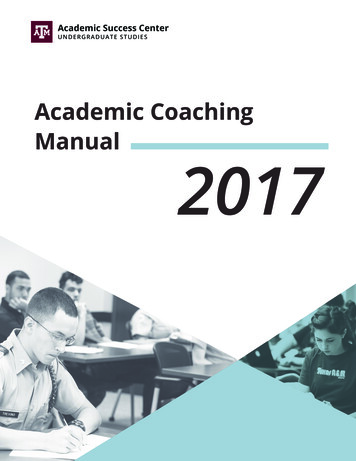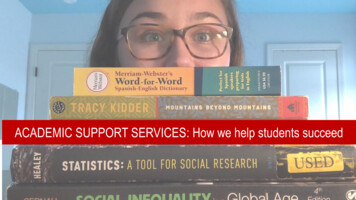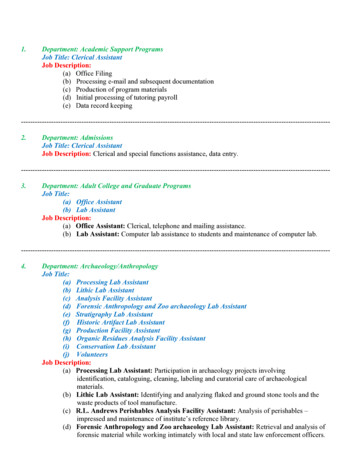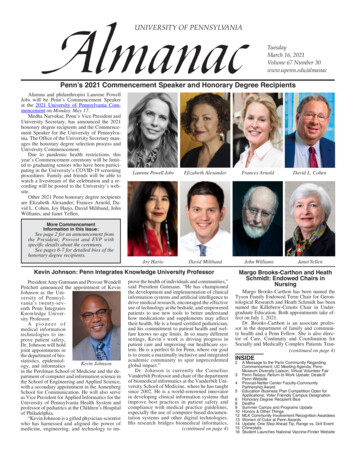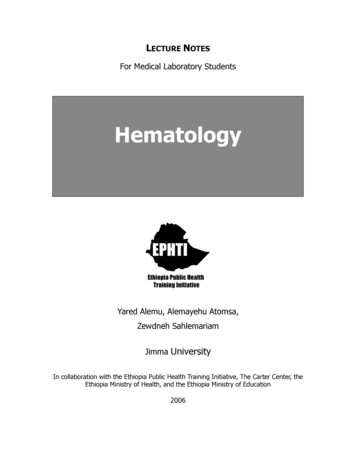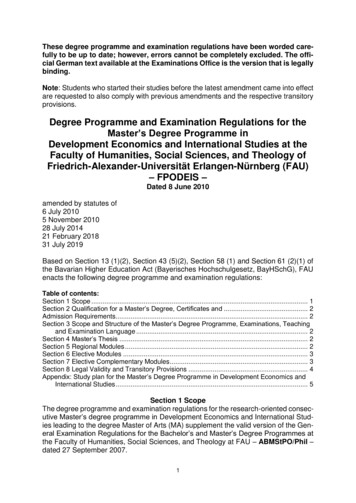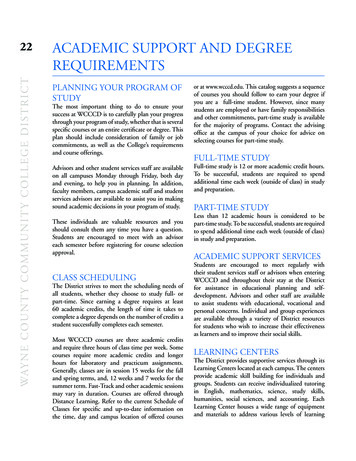
Transcription
WAY NE COUNT Y C OM MU NIT Y C OLLE GE D I S T RI C T22ACADEMIC SUPPORT AND DEGREEREQUIREMENTSPLANNING YOUR PROGRAM OFSTUDYThe most important thing to do to ensure yoursuccess at WCCCD is to carefully plan your progressthrough your program of study, whether that is severalspecific courses or an entire certificate or degree. Thisplan should include consideration of family or jobcommitments, as well as the College’s requirementsand course offerings.Advisors and other student services staff are availableon all campuses Monday through Friday, both dayand evening, to help you in planning. In addition,faculty members, campus academic staff and studentservices advisors are available to assist you in makingsound academic decisions in your program of study.These individuals are valuable resources and youshould consult them any time you have a question.Students are encouraged to meet with an advisoreach semester before registering for course selectionapproval.CLASS SCHEDULINGThe District strives to meet the scheduling needs ofall students, whether they choose to study full- orpart-time. Since earning a degree requires at least60 academic credits, the length of time it takes tocomplete a degree depends on the number of credits astudent successfully completes each semester.Most WCCCD courses are three academic creditsand require three hours of class time per week. Somecourses require more academic credits and longerhours for laboratory and practicum assignments.Generally, classes are in session 15 weeks for the falland spring terms, and, 12 weeks and 7 weeks for thesummer term. Fast-Track and other academic sessionsmay vary in duration. Courses are offered throughDistance Learning. Refer to the current Schedule ofClasses for specific and up-to-date information onthe time, day and campus location of offered coursesor at www.wcccd.edu. This catalog suggests a sequenceof courses you should follow to earn your degree ifyou are a full-time student. However, since manystudents are employed or have family responsibilitiesand other commitments, part-time study is availablefor the majority of programs. Contact the advisingoffice at the campus of your choice for advice onselecting courses for part-time study.Full-time studyFull-time study is 12 or more academic credit hours.To be successful, students are required to spendadditional time each week (outside of class) in studyand preparation.Part-Time StudyLess than 12 academic hours is considered to bepart-time study. To be successful, students are requiredto spend additional time each week (outside of class)in study and preparation.ACADEMIC SUPPORT SERVICESStudents are encouraged to meet regularly withtheir student services staff or advisors when enteringWCCCD and throughout their stay at the Districtfor assistance in educational planning and selfdevelopment. Advisors and other staff are availableto assist students with educational, vocational andpersonal concerns. Individual and group experiencesare available through a variety of District resourcesfor students who wish to increase their effectivenessas learners and to improve their social skills.LEARNING CENTERSThe District provides supportive services through itsLearning Centers located at each campus. The centersprovide academic skill building for individuals andgroups. Students can receive individualized tutoringin English, mathematics, science, study skills,humanities, social sciences, and accounting. EachLearning Center houses a wide range of equipmentand materials to address various levels of learning
difficulties. Students can use audiotapes, videotapes,classroom textbooks and computers.Students who need help to improve their writing andreading in English because English is not their nativelanguage or because of difficulty in completing collegecourses successfully are advised to take non-creditcourses in English as a second language. These coursesare also designed to help improve students’ Englishspeaking and listening abilities. Students shouldcontact the Learning Center to make arrangementsto take the ESL placement examination.SERVICES FOR STUDENTSWITH SPECIAL NEEDSEach campus offers services to students with specialneeds. Contact the Learning Center at the campus ofyour choice for more information.Downriver: 734-374-3211Downtown: 313-496-2703Eastern: 313-579-6923, Hearing Impaired 6984/MainNorthwest: 313-943-4063Western: 734-697-5190OPEN STUDIES(Developmental Education)Developmental Education coursework is designed tobuild upon existing skills in order to facilitate studentsuccess in the core curriculum at Wayne CountyCommunity College District.Developmentaleducation courses are offered in writing, reading andmathematics for students needing review in theseareas. The courses emphasize individual attention,personalized teaching, and learning in small supportgroups. Each course carries full college credit atWCCCD. Developmental Education courses are nottransferable to four-year institutions for academiccredit. The Developmental Education courses thatare offered are as follows: ENG 111 Introduction to Reading Skills ENG 112 Career and Technical Reading I ENG 113 Career and Technical Reading II ENG 114 Career and Technical Writing I ENG 115 Career and Technical Writing II MAT 100 Basic Mathematics MAT 105 Pre AlgebraLEARNING RESOURCECENTERSLearning Resource Centers (LRC) are located at allcampuses. Services in each of our Learning ResourceCenters include: computers and copiers for students,faculty and community use, special reserves, intercampus library loan, and circulation services. Studentsand faculty have access to a wide array of materialsin electronic and hardcopy formats selected tosupport study, research and recreational reading. Thegeneral library collection uses the Library of congressclassification arrangement. The Centers also maintaina collection of periodicals, documents, newspapersand media materials. Other resources include multimedia equipment and on-line access to the Librarydatabase.WCCCD is a member of the Detroit Area LibraryNetwork (DALNET), an intranet library andinformation network servicing the seven countiesSoutheast Michigan/Detroit Metropolitan area. Thecurrent DALNET members, along with WCCCD, are:Botsford General HospitalDetroit Institute of Arts LibraryDetroit Medical CenterDetroit Public LibraryHenry Ford - Benson Ford Research CenterJohn D. Dingle VA Medical CenterMacomb Community College LibraryMarygrove College LibraryMount Clemens General Hospital LibraryOakland Community College LibraryOakland County Law LibraryRochester CollegeUniversity of Detroit MercyUniversity of Detroit Mercy Architecture ImagingProjectUniversity of Detroit Mercy Great Lakes ShippingCollection DatabaseWalsh College LibraryWayne County Community College District LibraryWayne State UniversityWilliam Beaumont Hospital23WAY N E C O UN T Y C OMM U NIT Y C OLLEGE DIST RICTSERVICES FOR NON-NATIVESPEAKERS OF ENGLISH MAT 112 Elementary Algebra MAT 113 Intermediate Algebra
WAY NE COUNT Y C OM MU NIT Y C OLLE GE D I S T RI C T24DALNET at WCCCD and the WCCCD Librarieswebpages also provide hotlinks to healthcare andcommunity information, and Internet links toMichigan Electronic Library (MeL) free databasesas well as other WCCCD licensed Full Text Articledatabases on the web, plus access to the whole Internet.WCCCD students, faculty and staff can search theseresources from any college network-connected PC orremotely from the WCCCD website. Information maybe downloaded. The Learning Resource Coordinatorsschedule bibliographical instruction sessions forWCCCD instructors and classes. Instruction in theuse of equipment is conducted by campus LRC staffor the Media Specialist at District LRC.All campus LRCs have photocopy machines. WCCCDstudents must have the WCCCD Student ID/OneCard to use the photocopy machines as well as access allother LRC resources. Community members may use aWCCCD Guest Card to access services in the LRCs.Students also have borrowing privileges from manyMichigan libraries through DALNET, INFOPASS,Michigan Library Exchange (MiLE), and the StateLibrary Online Catalog (MeLCat). WCCCD DistrictLRC staff provides a variety of support services. Theseinclude the acquisition, processing, and cataloging ofprint, non-print and instructional materials, inputting,updating and management of bibliographical datain DALNET, setup and operation of public addressand audiovisual needs for College special events andworkshops, distribution, inventory and maintenanceof instructional audiovisual materials, College-wideinstructional media distribution and maintenance, andproject management, training and troubleshooting ofthe DALNET/Horizon system.District LRC313-496-2883Downriver LRCJohn Dingle Library734-374-3228Downtown LRCArthur Cartwright Library313-496-2358Eastern LRCJoseph Young, Sr. Library313-579-6911Northwest LRCJohn Conyers, Sr. Library313-943-4080Western LRCWilliam D. Ford Library 734-699-7008 ext. 5561CONTINUING EDUCATIONWORKFORCE DEVELOPMENTThe Continuing Education Division and WorkforceDevelopment provide the District with a quality ofservices that foster personal enrichment, professionaldevelopment and workforce development foremployees to upgrade skills thereby increasingcompetitiveness.Courses and workshops are offered to assistprofessionals in maintaining the mandatorycontinuing education requirements for certificationand licensure. Programs are offered to enrich theintellectual, physical, and emotional aspects ofan individual regardless of age. The District iscommitted to the design and delivery of innovativeprograms and courses that address the diverse needsof the business and community and contribute to theeconomic development of Wayne County. Districtgoals are achieved through the successful delivery ofnon-credit programs for special target populations.CONTINUING EDUCATIONThe Career and Professional Training componentis comprised of the Continuing Education Divisionprofessional development programs. Theseprograms offer diversified, short-term skills trainingprograms designed to provide individuals with theskills necessary for employment, skills upgrade,career advancement, certification/re-certification,and licensure. Some of the occupational-basedprograms include: Innovative training solutions Customer service training Advanced computer technology Government regulations Performance improvement Safety and health training Leadership development Measurable training resultsPersons enrolling in Personal Enrichment and Leisureprograms offered through Continuing EducationDivision are able to enjoy a variety of programsintended for their personal growth and development,and/or the attainment of personal goals, i.e.: fitnessand yoga courses, computer training, photography,gardening, cooking, and music and dance.
Community members and organizations enroll inContinuing Education special guest lectures, seminarsand workshops intended to address a specific needor topics of interest. Certain programs provide theflexibility of distance learning; allowing programparticipation online.WORKFORCE DEVELOPMENTThe Customized Contract Training providesquality, skill-specific training programs for business,industry, government agencies and professionalorganizations for training/retraining and relatedservices. Services include the following: Needs assessment and analysis Program and course design and delivery E-Learning and interactive classes Formative and summative evaluation Onsite training and support services.Customized contract training is designed anddelivered to client specifications. Programs alsoprovide solutions for occupational or organizationalissues, including management/leadership training,team building, process improvement, small businessservices, and front-end analysis. It is a cost effectiveand efficient solution for today’s employers who arecompeting in a global marketplace that is rapidlychanging.The District supports lifelong learning by providingrelevant training experiences. Regularly schedulednon-credit courses are offered at campuses and atdesignated off-site locations throughout the county.Distance LearningThe District’s distance learning offerings are designedto provide students with greater access to the District’sprograms and are available to all students. Distancelearning opportunities are available through Onlinecourses, ITV course offerings, Live-Interactiveonline courses, and satellite teleconferencing.Online Courses: These courses enable students toearn course credit through Internet connectionsat locations of their choosing. Students must haveaccess to a computer with an Internet connection andrelevant computer peripherals. Some Online/Internetcourses require periodic on-campus class sessions. Allonline course work occurs in a virtual environmentthat is accessible 24 hours a day, seven days a week.Interactive Television (ITV): ITV courses are offeredin specially-equipped classrooms which are linkedby two-way audio/two-way video conferencingtechnology to other campuses. This initiative linksthe campuses such as Downtown, Downriver,Eastern, Northwest, and Western together toallow students to participate in the same coursesimultaneously. This technology allows students andfaculty to interact between the campuses and allowsthem to see and hear each other live. ITV makes itpossible for students to participate in courses thatwere limited to them due to travel restrictions or lowenrollments.Live-Interactive Online (LIO): This technologyprovides students with the choice to come on campusfor instruction or stay at home and participate duringregular course meetings. Students need a computerwith an internet connection and relevant computerperipherals. An instructor sends text, graphics, andaudio to students’ computers simultaneously forinteractive learning experiences. Whether workingfrom home, work, or an on-campus classroom, allof the LIO students have the ability to ask “live”questions of the instructor and fellow students.Satellite Teleconferencing: This technology, housedat the Northwest campus, allows the College toprovide its students, staff, and community withprograms distributed via satellite. Programs areavailable on a variety of topics and generally allowthe audience to interact with program presenters toask questions or make comments via telephone and/or fax technologies. Program topics may includeacademic and professional information and updates,issues of interest to students, programs to support25WAY N E C O UN T Y C OMM U NIT Y C OLLEGE DIST RICTThe Continuing Education Division also provideschildren ages 7-15 years with the opportunity toenroll in programs designed to assist them with theextra motivation necessary to do well in school,while creating a foundation for continuous life-skillsbuilding. Children may enroll in courses to strengthenacademic and test-taking skills, nurture and interest indance, music, science, mathematics and art, discovernew recreational skills or enhance existing ones.
WAY NE COUNT Y C OM MU NIT Y C OLLE GE D I S T RI C T26specific discipline topics, and issues pertaining tocommunity development and advancement. Formore information concerning any of the District’sdistance learning opportunities, please contact theDistance Learning Department at distancelearning@wcccd.edu.Weekend CollegeWeekend courses leading to certificates and degreesare offered on Fridays and Saturdays at all campuses.The Weekend College Degree program is offered atthe Downtown Campus.Classes are offered on Friday evenings, Saturdaysand Sunday afternoons with the following optionsavailable:Degrees:Associate of ArtAssociate of ScienceAssociate of Applied Science(Business Administration)Associate of General StudiesCertificates:Business AdministrationFor a complete listing of Weekend College Degreeclasses, refer to the Schedule of Classes.DEGREE REQUIREMENTSRequirements for All DegreesCandidates applying for an associate degree at WayneCounty Community College District must meet thefollowing basic requirements: Complete at least 60 credit hours Complete a minimum of 15 credits of programrequirements at WCCCD Satisfy the American Government requirement Complete specific program core and academicgroup requirements (English 119 is required forall degrees) Have a minimum grade point average of 2.0upon completion.Requirements for SpecificDegreesAssociate of Arts (A.A.) DegreeThe associate of arts (A.A.) degree is designed forstudents who plan to transfer to a four-year collegeor university and for those who plan to earn aprofessional degree. Programs leading to the A.A.degree are designed for students who plan to major insuch areas as performing arts, English, humanities, orsocial sciences and for students who are preparing forprofessional programs in areas such as law, journalism,business administration, teaching and computerinformation systems.In order to receive the A.A. degree, students must(1) complete the “Requirements for All Degrees”and (2) complete the following academic grouprequirements:English 119, 120 . . . . . . . . . . . . . . . . . . . . 6 creditsHumanities . . . . . . . . . . . . . . . . . . . . . . . . 9 creditsMathematics/Science* . . . . . . . . . . . . . . . . 8 creditsSocial Science . . . . . . . . . . . . . . . . . . . . . . . 9 creditsAmerican Government . . . . . . . . . . . . . . . . 3 creditsElectives . . . . . . . . . . . . . . . . . . . . . . . . . . 25 credits(*One course must include a laboratory. See courses thatsatisfy the natural science requirement.)Students should also complete a minimum ofthree courses within one of the following areas ofconcentration: Anthropology, Economics, English,History, Mathematics, Philosophy, Political Science,Psychology, Sociology and Speech.Total . . . . . . . . . . . . . . . . . . . . . . . . . . . . . 60 creditsAssociate of Science (A.S.) Degree:This degree is designed for students who plan totransfer to a four-year college or university with amajor in the natural or physical sciences includingchemistry, mathematics, biology and physics. Coursesleading to an A.S. degree are designed for studentsenrolled in pre-professional studies for such areasas medicine, dentistry, engineering, dietetics, andenvironmental and natural resources.In order to receive the A.S. degree, students must(1) complete the “Requirements for All Degrees,”
and (2) complete the following academic grouprequirements:Associate of Applied Science (A.A.S.)Degree:This degree is designed to prepare students forimmediate employment in specialized areas such asmechanical and engineering technologies, health,business and office technologies and human services.The AAS degree is usually considered for vocationaltechnological and occupational fields leading directlyto employment in such areas as nursing, criminaljustice, aviation mechanics, child care, gerontology,mental health, addiction studies, drafting or computertechnology. However, many WCCCD students withthe AAS degree transfer to four-year colleges tocontinue their education while working.In order to receive the AAS degree, students must(1) complete the “Requirements For All Degrees,” (2)complete the following academic group requirements,and (3) adhere to the program course requirementsfor the specific AAS degree desired:General education . . . . . . . . . . . . . . . . . . 18 credits(American Government course requirement andENG 119 must be taken)Occupational specific . . . . . . . . . . . . . . . . 27 creditsOccupational support . . . . . . . . . . . . . . . . . .9 creditsElectives . . . . . . . . . . . . . . . . . . . . . . . . . . . .6 creditsTotal . . . . . . . . . . . . . . . . . . . . . . . . . . . . . .60 creditsThis degree program helps students who plan to studya variety of areas without committing themselvesto a specific field as they prepare for employmentor additional academic work. In order to receivethe AGS degree, students must (1) complete the“Requirements fo
online courses, and satellite teleconferencing. Online Courses: These courses enable students to earn course credit through Internet connections at locations of their choosing. Students must have access to a computer with an Internet connection and relevant co
